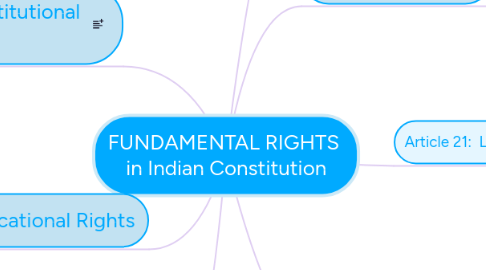FUNDAMENTAL RIGHTS in Indian Constitution
by VYSAKH RAJU RAJU


1. Right to Constitutional Remedies
1.1. Habeas Corpus
1.2. Mandamus
1.3. Prohibition
1.4. Certiorari
1.5. Quo warranto
2. Cultural & Educational Rights
2.1. Article 29: Minorities - language, script & culture
2.2. Article 30: Minority educational institutions
2.3. What is a minority?
3. Right to religious freedom
3.1. Article 25: Of Conscience
3.1.1. Conversion
3.2. Article 26: To manage religious affairs
3.3. Article 27: No tax for promotion of a particular religion
3.4. Article 28: Religious instruction
3.5. Equality of Religions
3.6. Are these rights only for minorities? What about the majority?
4. Article 21: Life & personal liberty
5. Right to Equality
5.1. Article 14: Equality before law
5.2. Article 15: Prohibition of Discrimination
5.3. Article 16: Equality of Opportunity
5.4. Article 17: Untouchability
5.5. Article 18: Abolition of titles
6. Right to Freedom
6.1. Article 19: 6 Fundamental Freedoms
6.1.1. Speech & Expression
6.1.2. Assemble peacefully
6.1.3. Form associations/unions
6.1.4. Travel anywhere in the country
6.1.5. Reside & settle anywhere in India
6.1.6. Practice any profession/trade/business
6.2. Article 20: Of accused
6.3. Article 21A: Primary Education
6.4. Article 22: Safeguards for arrested persons
6.4.1. Preventive Detention
